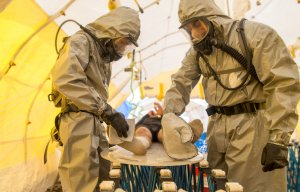
US Army highlights effectiveness of FiberTect
According Texas Tech University, preliminary tests on absorbent Fibertect nonwoven, prove it is successful at picking up the oily paste washing ashore at beaches and marshes across the Gulf State region. The test took place on the soiled beaches of Grand Isle, Loisiana. Seshadri Ramkumar, an associate professor of nonwoven technologies, said the Texas Tech-created nonwoven cotton absorbent wipe with activated carbon core makes it a perfect remediation too

18th June 2010
Innovation in Textiles
|
Grand Isle, Louisiana
 According Texas Tech University, preliminary tests on absorbent Fibertect nonwoven, prove it is successful at picking up the oily paste washing ashore at beaches and marshes across the Gulf State region. The test took place on the soiled beaches of Grand Isle, Loisiana.
According Texas Tech University, preliminary tests on absorbent Fibertect nonwoven, prove it is successful at picking up the oily paste washing ashore at beaches and marshes across the Gulf State region. The test took place on the soiled beaches of Grand Isle, Loisiana.
Seshadri Ramkumar, an associate professor of nonwoven technologies, said the Texas Tech-created nonwoven cotton absorbent wipe with activated carbon core makes it a perfect remediation tool for use by cleaning crews trying to remove the toxic material.
“Not only did it clean up the rust-coloured crude oil, but also it adsorbed toxic polycyclic aromatic hydrocarbon vapours reportedly sickening oil spill clean-up crew members. It definitely has proven itself a perfect product for cleaning up the oil spill,” Ramkumar said today.
“This preliminary test in Louisiana has shown that our wipe material is unique from others in that it easily absorbs liquids, and it has vapour-holding capacity. This will help workers clean beaches and stay safe at the same time,” added Ramkumar.
Ramkumar also said his latest research shows that raw cotton-carbon Fibertect can absorb oil up to 15 times its weight. Ramkumar says that unlike synthetic materials like polypropylene that are currently used in many oil containment booms, Fibertect is made from environmentally friendly raw cotton and carbon.
Amit Kapoor, president of First Line Technology, which distributes Fibertect commercially said the product has been tested in the lab with raw crude and motor oil but the company wanted to field-test the product. The product is manufactured by Hobbs Bonded Fibers, Waco, USA. Earlier this week, Kapoor a sales representative, who also works as an independent contractor for BP, to one of the worst-hit areas.
“We wanted to test the effectiveness of Fibertect on the crude oil for beach cleanup,” Kapoor said. “Fibertect was taken to the empty beaches of Grand Isle, and then laid out on top of a blob of oil that had settled on the beach. It worked very well in absorbing and containing the oil. The glob stuck to the Fibertect and did not release from the material.”
Though Kapoor said he had seen Fibertect pick up similar material with a pasty consistency, such as petroleum jelly, the results shocked the sales representative sent to run the experiment. “Our representative was shocked because he hadn’t seen a product work like that with the speed or the effectiveness,” Kapoor said. “He showed many other contractors that were working on the beach and they were impressed as well.”
Fibertect was approved for use as a sorbent by the U.S. Environmental Protection Agency, Ramkumar said. The product already has proven that it can also adsorb toxic fumes associated with chemical remediation, he said. Evaluation by Lawrence Livermore National Laboratory found that it can retain off gassing mustard vapours efficiently and does not shed loose particles.
Originally developed to protect the U.S. military from chemical and biological warfare agents, Fibertect contains a fibrous activated carbon centre that is sandwiched between layers. The top and bottom layers, made from raw cotton, can absorb oil while the centre layer holds volatile compounds such as the polycyclic aromatic hydrocarbons, or blistering agents such as mustard vapours or other toxic chemicals.
“Fibertect already has proven to be effective in the bulk decontamination of chemical warfare agents and toxic industrial chemicals, but our proposal here is to use it to aid in the clean-up efforts in the Gulf,” Kapoor said. “Fibertect allows for a green, environmentally safe, biodegradable technology that is perfect for the expanding effort to protect and decontaminate coastal lands and wildlife. We welcome the opportunity to work with the government, BP or anyone else in a joint effort to defend and preserve our planet.”
Contact: Seshadri Ramkumar, associate professor of nonwoven technologies, The Institute of Environmental and Human Health, Texas Tech University, (806) 885-4567, or [email protected] ; Amit Kapoor, president, First Line Technology, (703) 995-7510 or [email protected]

Business intelligence for the fibre, textiles and apparel industries: technologies, innovations, markets, investments, trade policy, sourcing, strategy...
Find out more